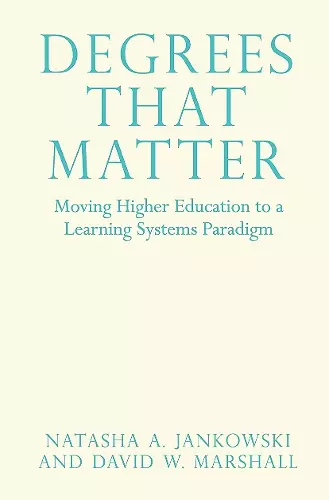Degrees That Matter
Moving Higher Education to a Learning Systems Paradigm
David W Marshall author Natasha A Jankowski author
Format:Hardback
Publisher:Taylor & Francis Inc
Published:17th Aug '17
Currently unavailable, and unfortunately no date known when it will be back
This hardback is available in another edition too:
- Paperback£33.99(9781620364642)

Sponsored by Concerned by ongoing debates about higher education that talk past one another, the authors of this book show how to move beyond these and other obstacles to improve the student learning experience and further successful college outcomes. Offering an alternative to the culture of compliance in assessment and accreditation, they propose a different approach which they call the Learning System Paradigm. Building on the shift in focus from teaching to learning, the new paradigm encourages faculty and staff to systematically seek out information on how well students are learning and how well various areas of the institution are supporting the student experience and to use that information to create more coherent and explicit learning experiences for students.The authors begin by surveying the crowded terrain of reform in higher education and proceed from there to explore the emergence of this alternative paradigm that brings all these efforts together in a coherent way. The Learning System Paradigm presented in chapter two includes four key elements—consensus, alignment, student-centeredness, and communication. Chapter three focuses upon developing an encompassing notion of alignment that enables faculty, staff, and administrators to reshape institutional practice in ways that promote synergistic, integrative learning. Chapters four and five turn to practice, exploring the application of the paradigm to the work of curriculum mapping and assignment design. Chapter six focuses upon barriers to the work and presents ways to start and options for moving around barriers, and the final chapter explores ongoing implications of the new paradigm, offering strategies for communicating the impact of alignment on student learning.The book draws upon two recent initiatives in the United States: the Tuning process, adapted from a European approach to breaking down siloes in the European Union educational space; and the Degree Qualifications Profile (DQP), a document that identifies and describes core areas of learning that are common to institutions in the US. Many of the examples are drawn from site visit reports, self-reported activities, workshops, and project experience collected by the National Institute for Learning Outcomes Assessment (NILOA) between 2010 and 2016. In that six-year window, NILOA witnessed the use of Tuning and/or the DQP in hundreds of institutions across the nation.
"This book is an important reminder of the necessity for college and university actors to become aware of the critical role they play in the construction of effective learning environments. The authors advocate for a renewed sense of agency where students, faculty, and administrators do not succumb to a culture of compliance. The authors not only ask for a more active and conscious participation in the construction of learning environments, but also for a more honest and public dialogue about the dynamics that work or do not work in higher education institutions. This book is required reading for educational leaders who want to construct creative, caring, and collaborative forms of learning in higher education institutions."
Teachers College Record
“Amid the clutter of higher education initiatives, Tuning and the Degree Qualifications Profile stand out as complementary and comprehensive pathways toward degrees that matter. This book explains why and how.”
James Grossman, Executive Director, American Historical Association
“Rather than rehashing current debates about the usefulness of higher education, Jankowski and Marshall focus on the heart of the matter, student learning. By rethinking tired conventions, by questioning long held assumptions, and by pointing to the most useful and applicable resources, they offer practical steps for making education more effective and students more successful. Every college or university could stand to benefit from the practical and principled advice this book advances.”
Paul L. Gaston, Trustees Professor, Kent State University
“Drawing on two historic outcomes-based frameworks developed in this century, the Degree Qualifications Profile and Tuning, Jankowski and Marshall describe and illustrate how institutions can now develop their own holistic learning system. Their ‘consensus-based, aligned, learner-centered, and communicated’ system prepares students with relevant twenty-first-century outcomes regardless of when they enter or re-enter our institutions. A must-read for institutional leaders, administrators, faculty, and staff across all institutional types.”
Peggy Maki, Higher Education Consultant specializing in assessing student learning
ISBN: 9781620364635
Dimensions: unknown
Weight: 439g
216 pages